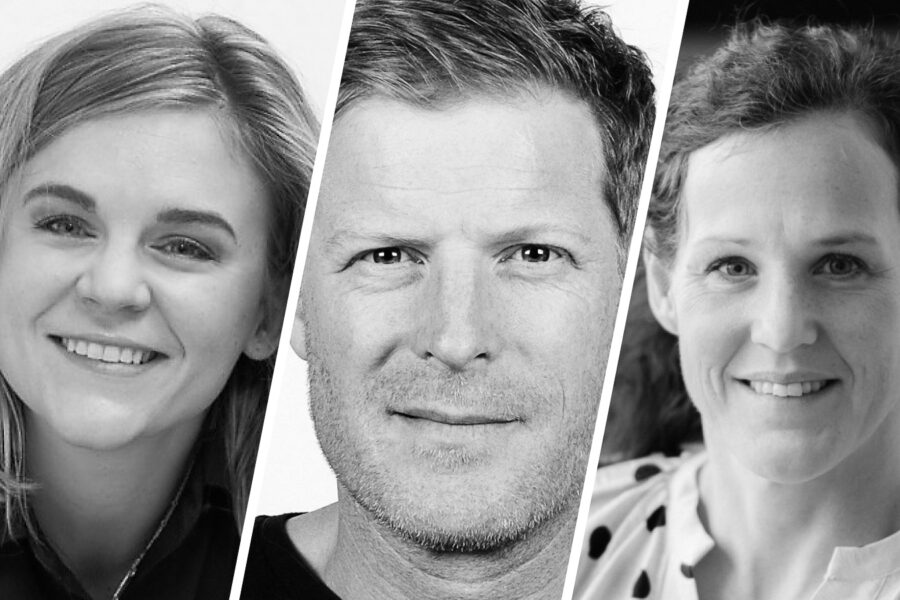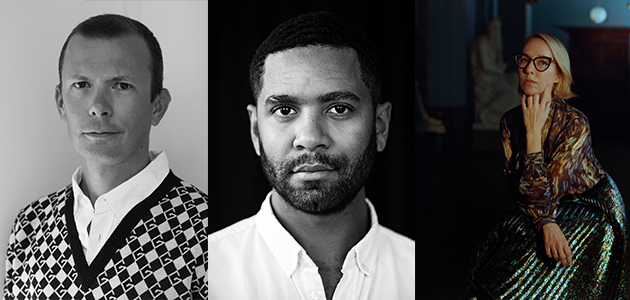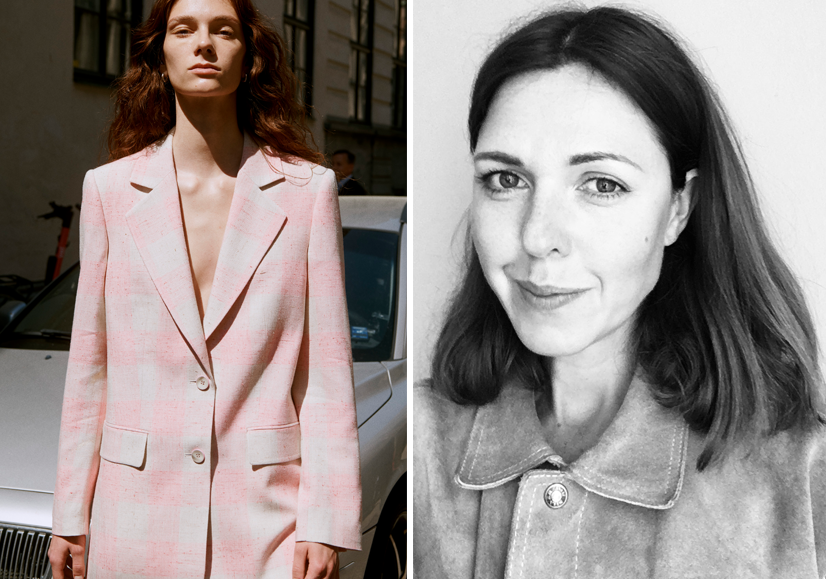
Encouragement for Action: the previous winners on what has happened after the prize – and the new projects for a better industry
We spoke with three previous winners of our sustainability project, Encouragement for Action, and asked them about the most important steps towards achieving transformation. Johan Graffner (Dedicated), Linn Frisinger (Swedish Stockings), and Angeline Elfström (OnceMore) share their experiences after winning the Encouragement for Action Prize, the steps they are taking to create a more sustainable industry, and where they believe more action is needed to drive change.
The trained economist, Linn Frisinger saw the documentary The Light Bulb Conspiracy about how companies deliberately manufacture products so that they will break after a certain time. Pantyhoses were pointed out as the example, since roughly 8 billion(!) tights, made of crude oil, are thrown away every year, which makes it women’s number one wear and tear garment. Frisinger felt urged to change this and founded Swedish Stockings, the world’s first eco-friendly pantyhose brand (the winner of the category Sustainable Identity at Encouragement For Actionin 2018).
Johan Graffner is a long-time fashion entrepreneur with a focus on maximizing benefits and minimizing negative impact. He’s the co-founder and CEO of DEDICATED, aiming to add fashion to the “sustainability world” and sustainability to the “fashion world”. In 2021, the brand won Encouragement For Action in the category Fashion Innovation.
Angeline Elfström is the Business Development Manager at OnceMore, responsible for developing the market for the pioneering new material OnceMore (Encouragement For Action winner in the Closing the Loop category, 2018) into a commercially viable solution for a more circular fashion industry. It’s the first open recycling system closing the loop for blended textile waste, collecting end-of-life textiles, post-consumer waste, separate cotton, and polyester to produce a high-quality pulp, new raw material for viscose and lyocell market, performing as well as traditional viscose.
How was it to win Encouragement For Action?
Angeline Elfström, OnceMore: It was a great moment and a confirmation that our innovation is the right thing to do. Parts of the citation for the award was that OnceMore is ’strengthening Sweden’s position as a circular forerunner.’In a relatively short space of time, we’ve taken it from an idea in our labs to a viable sustainable textile fibre. It has only been on the market for a few years but it has gone from strength to strength with major labels including Filippa K, Bestseller, and Lindex launching garments based on OnceMore.The prize stands out because of the different categories and everyone in the value chain – from traditional companies to startups, large and small – can be part of it, which makes it more dynamic and exciting.
Johan Graffner, Dedicated: A very welcomed sign of recognition both personally and for the whole team. The prize is what it says: An encouragement for businesses who are doing it right. We certainly felt encouraged to continue on our journey.
Linn Frisinger, Swedish Stockings: It’s always a great feeling to be recognized for the work you do. In everyday life, you never stop and reflect on things, when the focus is always put forward – in every aspect. However, winning a prize obviously helps with the motivation and mood of everyone in the company.
The prize is about encouraging action. How do you work with taking action to create a better industry?
Johan Graffner, Dedicated: We source our fabrics and partners very actively to ensure that the products always represent ’the better choice’ in terms of long use, the highest ethics, and the lowest CO2 footprint. This often means pioneering fabrics, like ROC (Regenerative Organic Certified) cotton and hemp. We also take action by planting a lot of trees and supporting organizations that are protecting the environment, such as Rena Mälaren and Sea Shepherd.
Linn Frisinger, Swedish Stockings: We want to influence the entire fashion industry to become more sustainable and we believe that one of the things to make it happen, is through partnerships. So, we work a lot with collaborations where we spread our expertise in the field and invite other brands to learn from each other and dare to turn competition into partnership. We’ve released collections together with the likes of Filippa K, GANNI, and Rodebjer, and produced for brands like Loewe and CHIMI.
Angeline Elfström, OnceMore: First, we are continuously working on improving our process, from the raw material with renewable wood and post-consumer textile waste to finished pulp. Second, we are working on our technical capabilities, to be able to broaden the specification: the textile waste we can recycle. Today we handle the most common blend in the market, polycotton blends, but our aim is to be able to take care of more materials to reduce the waste that ends up in landfills or is incinerated. Third, we can support brands and retailers in different ways. We can educate designers and product managers about our technology – challenges and opportunities – to reduce waste. We can support the communication to the consumers with facts and information about the raw material of the textile product they are about to buy. This will be very important in the coming years – no more greenwashing and claims without clear information.
In what part of the industry would you like to see more action, in order to drive change?
Linn Frisinger, Swedish Stockings: There is a lot of focus on sustainable and certified materials in the fashion industry, but not as much when it comes to production – environmentally, geographically, and socially. We need to focus more on how we extend the life of our garments but, above all, on the solutions we have to take care of them when we can no longer wear them. Over the years, the word ’sustainable’ has become increasingly used and even abused, there is no clear definition of what it really means. For us, it has been important to create our own definition to work from. Ours reads; ‘The highest form of sustainability is longevity.’ In short, it revolves around how we make these wear-and-tear garments live longer. Consumers are becoming so educated and aware that sooner or later they will see the brands that are not genuine with sustainability at all levels. Most of all, legal changes are required for real change in the industry.
Angeline Elfström, OnceMore: If we are going to make a real difference to the circularity of the industry, collaboration at all levels of the value chain is essential, from the top down. At the EU/national/regional level, we need to see legislation that will mandate the creation of an infrastructure around textile recycling. What do most people do with an old sock or a stained, tatty shirt? Usually, they throw them in the bin because they don’t know what else to do. We need collection and sorting facilities similar to those for sorting other household waste such as paper and glass. Facilities that are accessible and easy to use. Once we have the infrastructure, we need to educate the consumers on the importance of playing their part so they use the facilities regularly and correctly. Everyone in the value chain has a responsibility here, from legislators and brands to textile manufacturers and raw material suppliers. We need to join forces wherever possible to educate the public.
Johan Graffner, Dedicated: Political lobbying. At the moment it seems like H&M is doing the lobbying alone. This shifts Sweden from being a forerunner to being the EU’s policy laggard by, for example, opposing the law against the destruction of unsold goods. There must be heavy lobbying for stricter regulations in this completely unregulated chaos of a business. Responsible or Eco-fashion still has a lot of momentum in central Europe. There, they have hundreds of devoted eco-fashion retailers who are thriving. In Scandinavia, we just have a handful of responsible retailers and they are struggling. My take on this is that the heavy greenwashing from the fast fashion companies in Scandinavia has succeeded. It’s quite saddening and should not have been allowed to happen.
What else do you have coming, now and during the fall?
Linn Frisinger, Swedish Stockings: We will continue to invest heavily in collaborations to inspire and influence the industry as a whole. We will launch the sustainability tool B Corp to become more transparent, make it easier for the customer to make better choices, and make our products even more sustainable.
Johan Graffner, Dedicated: We’re launching collections with the Swedish horror/surrealist illustrator Hans Arnold and another one with the organization NON VIOLENCE. There is also a retro-movie collaboration with Gremlins.
Angeline Elfström, OnceMore: We will soon launch our results from a life cycle assessment which is eagerly awaited by customers and brands. We are working with new partners, one of them is the Swedish Fashion Council and we will be present in their showroom in Paris for SS24.




